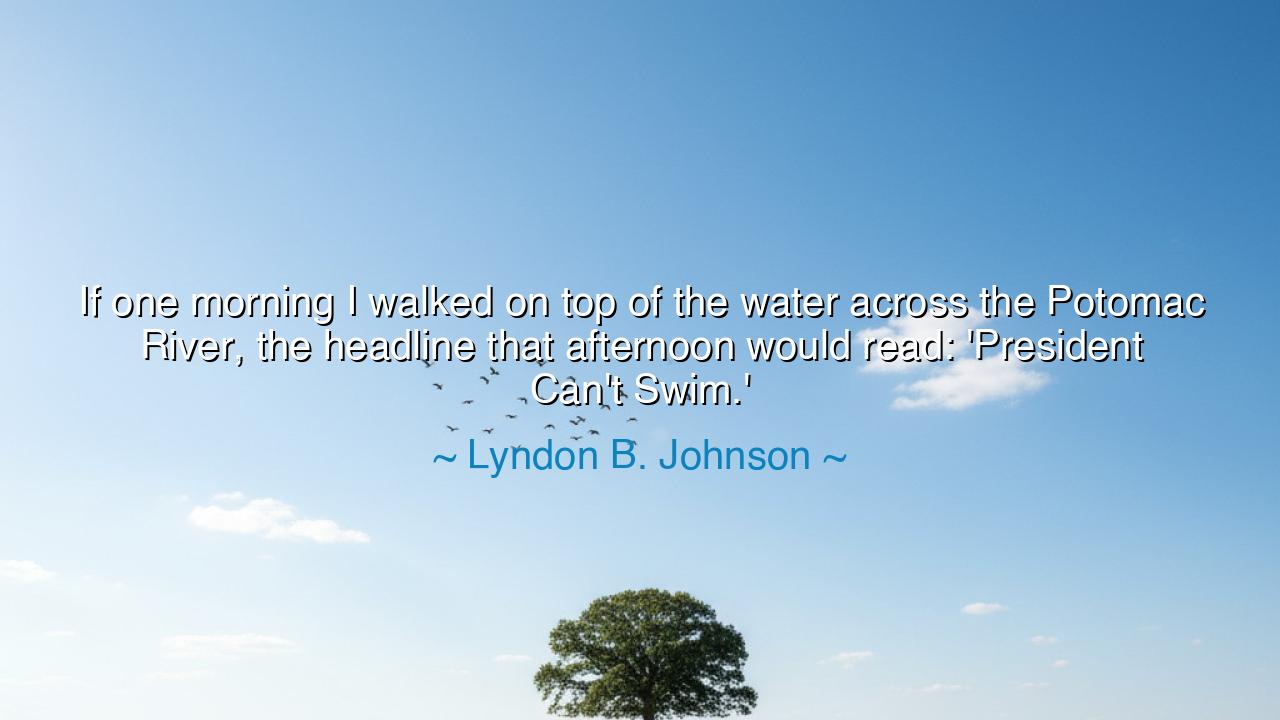
If one morning I walked on top of the water across the Potomac
If one morning I walked on top of the water across the Potomac River, the headline that afternoon would read: 'President Can't Swim.'






"If one morning I walked on top of the water across the Potomac River, the headline that afternoon would read: 'President Can't Swim.'" – Lyndon B. Johnson
In this wry and piercing remark, Lyndon B. Johnson, the 36th President of the United States, laid bare one of the timeless burdens of leadership — the inevitability of criticism and misunderstanding. When he said, “If one morning I walked on top of the water across the Potomac River, the headline that afternoon would read: ‘President Can’t Swim,’” he was not boasting of miraculous power, but lamenting the cynicism that so often greets those in authority. Beneath his humor lies a profound truth: no deed, however extraordinary, escapes distortion in the eyes of those determined to find fault.
The origin of this quote belongs to the turbulent years of Johnson’s presidency in the 1960s — a time marked by both triumph and turmoil. Johnson had risen from humble Texas roots to become one of America’s most powerful political figures. He championed the Civil Rights Act, the War on Poverty, and the vision of a “Great Society.” Yet, despite his achievements, his reputation was often shadowed by controversy, particularly over the Vietnam War. His quote, half jest and half lament, emerged from this climate of relentless scrutiny — a world where even his successes were twisted into failures by those who mistrusted his motives.
At its core, Johnson’s statement reflects an ancient truth that every leader, artist, or visionary must learn: perception is often stronger than reality. In a society driven by judgment and spectacle, even miracles are met not with awe, but suspicion. His image of walking on water — a symbol of divine power and impossible grace — is deliberately exaggerated to expose the absurdity of criticism divorced from fairness. It is a satire on the press, yes, but also a meditation on human nature’s tendency to find fault, to magnify flaws even in greatness.
History offers many mirrors to Johnson’s lament. Consider Abraham Lincoln, reviled in his own time by half the nation he sought to preserve. Newspapers mocked him, rivals called him a tyrant, and critics derided his speeches as foolish. Yet the same man who was ridiculed in life became revered in death — proof that the truth of character is often invisible to the impatient eyes of the present. Johnson’s words thus speak not only of politics, but of the universal fate of those who dare to lead: the loneliness of being misunderstood, the pain of seeing noble intentions mocked by small minds.
But there is also a deeper moral warning within his humor — a reminder to those who judge too easily. For when society delights in cynicism, when the press and the people celebrate tearing down more than building up, they blind themselves to greatness. Cynicism may feel intelligent, but it breeds blindness to truth. Johnson’s quip is not merely self-pity; it is a mirror held up to a world that mistakes criticism for wisdom. The danger, he implies, is that a civilization too eager to mock its leaders will one day find itself without anyone brave enough to lead.
For those who create, who teach, who govern, or who dream, Johnson’s words carry both comfort and command. Do not seek applause; seek integrity. For the world will always find something to say — even of those who walk upon water. Let your actions be guided not by the noise of opinion, but by the still voice of conscience. If you are misunderstood, take solace in knowing that truth endures long after the critics fall silent. The headlines fade; the legacy remains.
So remember this, my child of tomorrow: when you rise to do something great, expect the world to doubt you. Do it anyway. When your intentions are twisted, hold your ground. For every voice that mocks, there are eyes unseen that will one day understand. Johnson’s humor cloaked a hard-won wisdom: greatness and criticism are twins, born of the same act of courage. To walk upon water is to invite judgment, but to walk anyway — that is the mark of one who leads not for approval, but for the sake of what is right.






AAdministratorAdministrator
Welcome, honored guests. Please leave a comment, we will respond soon